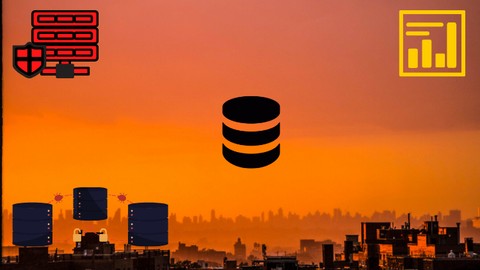
Understanding Databases using SQL – Basic
Understanding Databases using SQL – Basic, available at Free, has an average rating of 4.3, with 14 lectures, based on 72 reviews, and has 8412 subscribers.
You will learn about As SQL provides a systematic method of creating, updating, retrieving, and storing information in a database. As SQL allows to query data, sort data, and manipulate data in various ways SQL is a backend technology that allows us to store and manipulate data with various programming language like Python ,languages on .Net plartform, Java, Android etc. This course is ideal for individuals who are Anybody who wants who wants to handle data or Anybody who would like to carry out data analytics or Who would like to know about the concepts such as ERD and Constraints It is particularly useful for Anybody who wants who wants to handle data or Anybody who would like to carry out data analytics or Who would like to know about the concepts such as ERD and Constraints.
Enroll now: Understanding Databases using SQL – Basic
Summary
Title: Understanding Databases using SQL – Basic
Price: Free
Average Rating: 4.3
Number of Lectures: 14
Number of Published Lectures: 14
Number of Curriculum Items: 17
Number of Published Curriculum Objects: 17
Original Price: Free
Quality Status: approved
Status: Live
What You Will Learn
- As SQL provides a systematic method of creating, updating, retrieving, and storing information in a database.
- As SQL allows to query data, sort data, and manipulate data in various ways
- SQL is a backend technology that allows us to store and manipulate data with various programming language like Python ,languages on .Net plartform, Java, Android etc.
Who Should Attend
- Anybody who wants who wants to handle data
- Anybody who would like to carry out data analytics
- Who would like to know about the concepts such as ERD and Constraints
Target Audiences
- Anybody who wants who wants to handle data
- Anybody who would like to carry out data analytics
- Who would like to know about the concepts such as ERD and Constraints
Overview of Database Management Systems –
Overview of DBMS, Advantages of DBMS, Introduction to RDBMS, overall system architecture
Database Management System Models –
Relational model, Normalization, ER model, Mapping Cardinalities.
Structured Query Language –
DQL, DDL, DML, DCL, and TCL
Introduction to SQL, SQL Datatypes, Components of SQL, Range Operators(In, Between, Like, NULL Predicate), Clauses(into, where), Constraints, implementation of constraints in SQL
Course Curriculum
Chapter 1: Introduction to SQL and
Lecture 1: Introduction
Chapter 2: SQL, SeQUEL, Queries/SQL statements, Data Types
Lecture 1: Understand the difference between SQL and SEQUEL, SQL statement and Data Types
Chapter 3: MySQL – open source database – structured query language
Lecture 1: MySQL – open source software for databases – structured query language
Lecture 2: Various Data Types in Oracle 10g along with Select and Insert statement
Chapter 4: DML statements with where clause
Lecture 1: DML statements with where condition and relational operators
Chapter 5: Delete statement with where condition and how to use logical operators
Lecture 1: Delete statement with where condition and how to use logical operators
Chapter 6: Understanding Entity Relationship Model
Lecture 1: Understanding ERD and Normalization Concepts
Lecture 2: Understanding Entity Relationship Model
Lecture 3: Learning Constraints , mainly Primary Key constraint
Chapter 7: Learning Constraints, Foreign Key
Lecture 1: Learning Constraints, Foreign Key
Lecture 2: Learning Constraints, Foreign Key
Chapter 8: Understanding Integrity, Foreign and Business Constraints
Lecture 1: Understanding Integrity, Foreign and Business Constraints
Chapter 9: How to create many to many(m:n) relationship in SQL
Lecture 1: How to create many to many(m:n) relationship in SQL
Chapter 10: To understand few more Operators/Clauses
Lecture 1: To understand few more Operators/Clauses
Instructors
-
Madhavi Vaidya
Asst Professor and Teacher
Rating Distribution
- 1 stars: 8 votes
- 2 stars: 4 votes
- 3 stars: 23 votes
- 4 stars: 16 votes
- 5 stars: 21 votes
Frequently Asked Questions
How long do I have access to the course materials?
You can view and review the lecture materials indefinitely, like an on-demand channel.
Can I take my courses with me wherever I go?
Definitely! If you have an internet connection, courses on Udemy are available on any device at any time. If you don’t have an internet connection, some instructors also let their students download course lectures. That’s up to the instructor though, so make sure you get on their good side!
You may also like
- Top 10 Video Editing Courses to Learn in November 2024
- Top 10 Music Production Courses to Learn in November 2024
- Top 10 Animation Courses to Learn in November 2024
- Top 10 Digital Illustration Courses to Learn in November 2024
- Top 10 Renewable Energy Courses to Learn in November 2024
- Top 10 Sustainable Living Courses to Learn in November 2024
- Top 10 Ethical AI Courses to Learn in November 2024
- Top 10 Cybersecurity Fundamentals Courses to Learn in November 2024
- Top 10 Smart Home Technology Courses to Learn in November 2024
- Top 10 Holistic Health Courses to Learn in November 2024
- Top 10 Nutrition And Diet Planning Courses to Learn in November 2024
- Top 10 Yoga Instruction Courses to Learn in November 2024
- Top 10 Stress Management Courses to Learn in November 2024
- Top 10 Mindfulness Meditation Courses to Learn in November 2024
- Top 10 Life Coaching Courses to Learn in November 2024
- Top 10 Career Development Courses to Learn in November 2024
- Top 10 Relationship Building Courses to Learn in November 2024
- Top 10 Parenting Skills Courses to Learn in November 2024
- Top 10 Home Improvement Courses to Learn in November 2024
- Top 10 Gardening Courses to Learn in November 2024





















